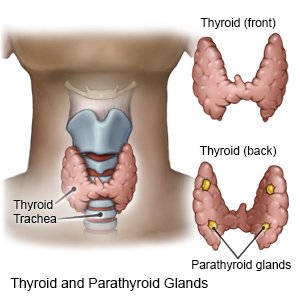Autoimmune Thyroid Disorders
Medically reviewed by Drugs.com. Last updated on Apr 6, 2025.
What are autoimmune thyroid disorders?
Autoimmune thyroid disorders are when your immune system attacks your thyroid gland. The thyroid gland is a butterfly-shaped organ that is found in the front part of your neck. Thyroid hormones regulate body temperature, heart rate, and weight gain or loss.
 |
What are the kinds of autoimmune thyroid disorders?
Autoimmune thyroid disorders can cause hyperthyroidism or hypothyroidism. Hyperthyroidism is when the thyroid gland makes too much thyroid hormone. Graves disease is the most common kind of autoimmune hyperthyroidism. Hypothyroidism is when the thyroid gland does not make enough thyroid hormone. Hashimoto thyroiditis is the most common kind of autoimmune hypothyroidism.
What increases my risk for autoimmune thyroid disorders?
- Family history of autoimmune disease
- Not enough iodine in your diet
- Stress
- Smoking
What are the signs and symptoms of autoimmune thyroid disorders?
You may have a goiter (enlarged thyroid gland) that feels like a lump on your neck. You may also have signs and symptoms of one or both conditions:
- Hyperthyroidism:
- Nervousness, restlessness
- Tired and hot
- Diarrhea
- Tremors and a fast heartbeat
- Weight loss and hunger, even after you eat
- Eyes that bulge
- Hypothyroidism:
- Weakness, muscle aches, or joint aches
- Dry, flaky skin or thin and brittle fingernails or hair
- Changes in your voice, such as hoarseness
- Sudden weight gain
- Sleepiness or problems thinking clearly
- Slow heartbeat or trouble breathing
Drugs used to treat this and similar conditions
Synthroid
Synthroid (levothyroxine) treats hypothyroidism (low thyroid hormone) and different types of ...
Armour Thyroid
Armour Thyroid is used for hashimoto's disease, hypothyroidism, after thyroid removal, thyroid ...
Omvoh
Omvoh is used to treat moderate to severe ulcerative colitis or Crohn's disease in adults. This ...
Tirosint
Tirosint is used for hashimoto's disease, hypothyroidism, after thyroid removal, myxedema coma ...
Levoxyl
Levoxyl treats hypothyroidism (low thyroid hormone) and treats or prevents goiter. Learn about side ...
Nature-Throid
Nature-Throid is used for hashimoto's disease, hypothyroidism, after thyroid removal, thyroid ...
Levo-T
Levo-T is used for hashimoto's disease, hypothyroidism, after thyroid removal, myxedema coma ...
Euthyrox
Euthyrox (levothyroxine) is used to treat hypothyroidism and to treat or prevent goiter. Includes ...
NP Thyroid
NP Thyroid is used for hashimoto's disease, hypothyroidism, after thyroid removal, thyroid cancer ...
Tirosint-Sol
Tirosint-SOL is an oral levothyroxine (L-thyroxine [T4]) solution that may be used in adults and ...
How are autoimmune thyroid disorders diagnosed?
- Blood tests check the level of thyroid hormones in your blood.
- An ultrasound uses sound waves to show pictures of your thyroid on a monitor.
- A thyroid scan shows how well your thyroid is working. You may be given a dye before the pictures are taken to help healthcare providers see the pictures better. Tell the healthcare provider if you have ever had an allergic reaction to contrast dye.
- Fine needle biopsy is a procedure where a small needle is used to take a sample of your thyroid gland for tests.
How are autoimmune thyroid disorders treated?
- Thyroid medicines replace, increase, or decrease your thyroid hormone levels. They may also help control your signs and symptoms. You may need other medicines to treat fast heartbeats, nervousness, or trembling.
- A radioactive form of iodine is given to treat hyperthyroidism. It damages or kills some of the thyroid gland cells.
- Surgery to remove your thyroid may be needed if other treatments do not work.
Treatment options
The following list of medications are related to or used in the treatment of this condition.
When should I contact my healthcare provider?
- You have a fever.
- Your signs and symptoms return or become worse.
- You have pain, redness, and swelling in your muscles and joints.
- You have questions or concerns about your condition or care.
When should I seek immediate care or call 911?
- You have sudden chest pain or trouble breathing.
- Your heart is fluttering and you feel restless.
- You have slurred speech, problems with balance or walking, or cannot think clearly.
- You have swelling in your legs, ankles, or feet.
- You feel faint or had a seizure.
Care Agreement
You have the right to help plan your care. Learn about your health condition and how it may be treated. Discuss treatment options with your healthcare providers to decide what care you want to receive. You always have the right to refuse treatment. The above information is an educational aid only. It is not intended as medical advice for individual conditions or treatments. Talk to your doctor, nurse or pharmacist before following any medical regimen to see if it is safe and effective for you.© Copyright Merative 2025 Information is for End User's use only and may not be sold, redistributed or otherwise used for commercial purposes.
Learn more about Autoimmune Thyroid Disorders
Treatment options
- Medications for Autoimmune Disorders
- Medications for Hashimoto's disease
- Medications for Immunodeficiency
- Medications for Thyroid Disease
Care guides
- Autoimmune Disease
- Primary Immune Deficiency Disorder
- Primary Immune Deficiency Disorder in Children
- Subclinical Hyperthyroidism
Medicine.com guides (external)
Further information
Always consult your healthcare provider to ensure the information displayed on this page applies to your personal circumstances.
